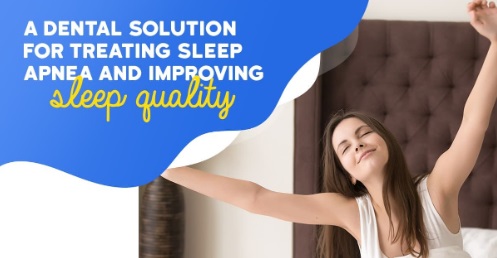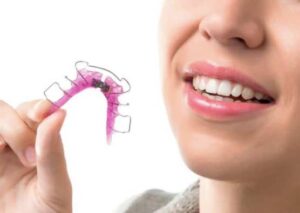Breathe Easy, Sleep Soundly: The Magic of Sleep Apnea Mouth Guards
A restful night’s sleep isn’t just about feeling refreshed in the morning; it’s a foundation for your overall health. However, for individuals with sleep apnea, uninterrupted sleep is often out of reach. Characterized by frequent breathing interruptions during sleep, sleep apnea not only robs individuals of quality rest but also imposes serious health risks. While treatments like CPAP machines are common, one underappreciated yet effective solution is the sleep apnea mouth guard. Lightweight, easy to use, and often more comfortable than other treatments, these innovative devices are changing lives one good night’s sleep at a time.
If you or a loved one struggles with sleep apnea, this guide will help you understand how mouth guards can be a game-changer in managing this common condition.
Understanding Sleep Apnea
What Is Sleep Apnea and Its Types?
Sleep apnea is a sleep disorder in which breathing repeatedly stops and starts during sleep. It falls into two primary categories:
- Obstructive Sleep Apnea (OSA): The more common type, caused by the relaxation of throat muscles, which blocks the airway.
- Central Sleep Apnea (CSA): Occurs when the brain fails to send proper signals to the muscles controlling breathing.
While both types have distinct mechanisms, their impact on health can be equally severe if left untreated.
Who Is Affected?
Sleep apnea affects millions of people worldwide. Studies suggest that nearly 22 million Americans suffer from sleep apnea, with many cases remaining undiagnosed. Certain factors like age, gender, and health conditions contribute to one’s risk:
- Gender: Men are more likely to develop sleep apnea than women.
- Weight: Obesity significantly raises the risk, as excess fat around the neck can obstruct the airway.
- Age: Risk increases as individuals over 40 begin losing muscle tone that supports their airway.
Why Treatment Matters
Ignoring sleep apnea is not just a bad idea; it’s dangerous. Without proper treatment, it can lead to:
- Cardiovascular problems: High blood pressure, heart attacks, and arrhythmias are linked to untreated sleep apnea.
- Cognitive issues: Poor quality sleep affects memory, focus, and judgment.
- Daytime fatigue: Chronic sleepiness raises the risk of workplace errors and car accidents.
Seeking effective treatment is critical for improving both sleep quality and overall health.

Symptoms and Health Consequences of Sleep Apnea
Recognizing the Symptoms
The symptoms of sleep apnea aren’t always obvious, but some warning signs include:
- Loud, persistent snoring
- Gasping or choking sounds during sleep
- Extreme daytime sleepiness
- Irritability or mood swings
- Morning headaches or dry mouth
These signs, individually or collectively, indicate the need for medical evaluation.
Understanding Health Impacts
Unchecked sleep apnea can wreak havoc on your body over time. Apart from the cardiovascular consequences, it has also been tied to:
- Diabetes: Sleep disruption impacts glucose metabolism, increasing the risk of type 2 diabetes.
- Weight gain: Fatigue can impair metabolism and lead to weight gain, exacerbating sleep apnea’s severity.
- Mental health struggles: Chronic poor sleep may lead to depression or anxiety.
Timely treatment can help avoid these complications and restore your quality of life.
Why Prioritize Treatment?
If you suspect sleep apnea, don’t wait. Effective interventions not only improve sleep but reduce long-term health risks. One of the increasingly popular and patient-friendly treatment options is the sleep apnea mouth guard.
Traditional Treatments for Sleep Apnea
CPAP Machines
Continuous Positive Airway Pressure (CPAP) machines are widely recommended and effective. They deliver a steady stream of air through a mask to keep your airway open. However, many patients find CPAP uncomfortable or struggle with compliance due to:
- Bulky equipment
- Noise during operation
- Difficulty sleeping while wearing the mask
Surgical Options
For severe cases, surgical interventions to remove or reposition obstructive tissues may be considered. However, these procedures are invasive, involve recovery time, and come with inherent risks.
Lifestyle Changes
Modifying certain habits can also help manage symptoms. Weight management, avoiding alcohol before bedtime, and practicing side-sleeping can complement medical treatments but may not fully resolve the issue.
This brings us to a less invasive yet effective alternative: mouth guards for sleep apnea.
The Role of Mouth Guards in Treating Sleep Apnea
Understanding Sleep Apnea Mouth Guards
Sleep apnea mouth guards treatment, also known as oral appliances, are custom-made devices designed to keep your airway open during sleep. By repositioning the jaw or tongue, these guards help prevent airway blockages that cause apnea episodes, providing a non-invasive treatment option for those suffering from this condition.
Different Types of Mouth Guards
There are two primary types of sleep apnea mouth guards:
- Over-the-Counter (OTC) Mouth Guards: These are easily accessible and budget-friendly, but they often lack the precision fit necessary for optimal effectiveness due to their generic design.
- Custom-Fitted Mouth Guards: Crafted by a dentist or sleep specialist, these guards are specifically tailored to fit your mouth, ensuring maximum comfort and efficacy. Their personalized fit makes them a more effective choice for treating sleep apnea.
How Mouth Guards Improve Sleep Apnea
The primary function of these mouth guards is to adjust the positioning of the jaw and tongue. By advancing the lower jaw or stabilizing the tongue, they help maintain an open airway throughout the night. This adjustment reduces the risk of obstructions and allows for uninterrupted breathing during sleep, ultimately enhancing overall sleep quality.
Benefits of Using Mouth Guards
1. Enhanced Sleep Quality
Mouth guards can reduce the frequency and severity of apnea episodes, leading to better oxygen flow throughout the night. Patients report waking up refreshed instead of groggy.
2. A Non-Invasive Solution
Unlike CPAP machines or surgeries, mouth guards are simple, non-invasive devices. They don’t require masks, tubes, or extensive procedures, making them a less intimidating treatment option.
3. Comfort and Portability
Custom mouth guards are lightweight, compact, and easy to travel with, ensuring continuous treatment wherever you go. Additionally, most patients find them far easier to adapt to compared to CPAP masks.
With these advantages, mouth guards are gaining popularity as a practical solution for mild to moderate cases of sleep apnea.
Choosing the Right Mouth Guard
Consult a Specialist
It’s essential to work with a sleep specialist or dentist who understands your condition and can recommend the most suitable device.
Understand Your Options
Custom-fitted mouth guards may come at a higher initial cost but are far superior in terms of comfort and effectiveness compared to one-size-fits-all OTC options.
Budget Considerations
While costs vary, many insurance plans cover sleep apnea treatments, including custom mouth guards. Speak with your provider for clarity on coverage.

Discover the Difference at Macedo Smile Designer
At Macedo Smile Designer, we offer exceptional care and expertise in addressing sleep apnea. Our clinic is dedicated to improving your quality of life through innovative solutions and personalized attention.
Unmatched Expertise
Guided by Dr. Macedo, our team specializes in sleep apnea management. With years of experience and a compassionate approach, we ensure you receive the care you deserve. Our expertise is your assurance of effective treatment.
Advanced Technology
Utilizing cutting-edge 3D imaging technology, we create custom mouth guards tailored to your specific needs. This precision allows us to combine accuracy and comfort, giving you the best possible solution for your sleep apnea.
Personalized Treatment Plans
We believe in individualized care, ensuring that every patient receives a treatment plan designed for long-term success and satisfaction. We take the time to understand your concerns, customizing solutions that fit your lifestyle and needs.
Convenient and Accessible
Our clinic’s convenient location, flexible hours, and straightforward appointment scheduling make access to treatment simple and hassle-free. We prioritize making your experience as smooth as possible, fitting seamlessly into your busy schedule.
Choose Macedo Smile Designer for a patient-centered approach to sleep apnea management. With our expertise, advanced technology, and commitment to personalized care, we strive to deliver lasting results and enhanced well-being. Experience the difference today.
Navigating Challenges and Making Informed Decisions
Adjusting to a Mouth Guard:
Adapting to a mouth guards for sleep apnea might take some time, typically around one to two weeks. During this period, you may experience common issues such as jaw soreness or increased drooling. Rest assured, these inconveniences are usually temporary and tend to diminish as you grow accustomed to wearing the device.
Knowing When a Mouth Guard Isn’t Enough:
While mouth guards are effective for mild to moderate sleep apnea, they may not suffice for severe cases. If you’re dealing with significant symptoms, it might be necessary to explore a combination of treatments. Consulting with a healthcare professional can provide clarity on the best course of action to manage your sleep apnea effectively.
The Importance of Ongoing Check-Ups:
Regular follow-ups play a vital role in ensuring your mouth guard continues to provide optimal benefits. Over time, as your needs evolve, these appointments help confirm that the mouth guard fits snugly and functions effectively. Consistent check-ups allow for adjustments and modifications, ensuring the device remains aligned with your treatment goals.
Conclusion
Overall, managing sleep apnea through the use of a mouth guard is a highly effective and non-invasive solution. With proper care and maintenance, it can provide relief from symptoms and improve your overall quality of life. However, it’s important to consult with a healthcare professional before choosing this treatment option and to attend regular check-ups to ensure its continued effectiveness. By taking these steps, you can successfully manage your sleep apnea and enjoy better restful nights. Remember to also incorporate healthy lifestyle habits such as maintaining a consistent sleep schedule and avoiding alcohol before bedtime for optimal results. Don’t let sleep apnea disrupt your life any longer – take action today! Remember, always prioritize your health and well-being, and don’t hesitate to seek help when needed. With the right treatment and support, you can overcome sleep apnea and improve your overall quality of life. Here’s to a restful night’s sleep!
https://www.google.com/maps?cid=11223011915097161618
https://advancedcenterforcosmeticdentistry.com/
